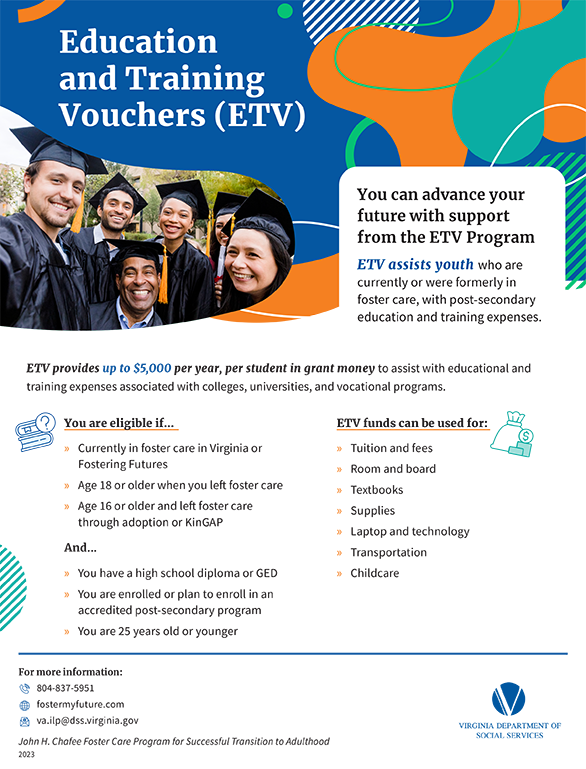Education and Training Voucher (ETV) Program
The Education and Training Voucher (ETV) Program assists teens and young adults who are in foster care or were formerly in foster care with post-secondary education and training expenses.
Current funding includes up to $5,000 per year or the total cost of attendance per year (whichever is less), per eligible student. ETV funds can be combined with other grants or scholarships to minimize or eliminate the need for student loans.
Eligible ETV expenses include:

- Tuition, fees
- Room, board
- Rental or purchase of required equipment, materials, supplies (including a computer)
- Books
- Transportation
- Special study projects
- Child care
- Accommodations related to the student's disability, such as a personal assistant or specialized equipment that is not paid for by another source
- Expenses related to the youth's work experience in a cooperative education program
- Student loan fees or insurance premiums on the student loan
- Other educationally-related expenses
To apply, students must meet the following eligibility requirements:
Students ages 14 to 21:
- Must have had their most recent foster care provided by the state of Virginia.
- Eligible for services under the John H. Chafee Foster Care Program for Successful Transition to Adulthood (Chafee Program), which is offered to all eligible foster care teens and young adults between the ages of 14 and 21. Each individual in care, age 14 and over, must have a written transition plan based on their needs, regardless of goal and placement. They must participate directly in designing their own program activities and accept personal responsibility for achieving independence.
- High school diploma or equivalent, or General Education Development (GED) certificate.
- If pursuing post-secondary education, applicant should complete and submit the Federal Application for Student Aid (FAFSA).
- Make satisfactory academic progress by maintaining at least a cumulative grade point average of 2.0 on a 4.0 scale, or have an academic standing consistent with the institution's graduation requirements for the federal student financial aid program.
Students ages 21 to 26:
- Meet eligibility requirements for teens and young adults ages 14 up to 21 listed above, with the exception of a transition plan.
Adopted/Kinship Guardianship Assistance Program (KinGAP) Youth:
- Youth adopted from Virginia's foster care system or in the KinGAP Program after reaching age 16 are eligible for the ETV Program, provided they meet the same eligibility requirements for foster youth and who would have been otherwise eligible for services under Virginia's Chafee Program.
Youth with out of state foster care experiences:
- Youth with foster care experience outside of Virginia should contact the State that provided their foster care services for information on how to apply for ETV. Contact list found here.
How to Apply:
Completed applications should be submitted to the local department of social services where the student is, or most recently was, in foster care or Fostering Futures. Applicants may apply for tuition and fees for the entire academic year; equal disbursements will be made for each term (e.g. semester, quarter, trimester, etc.)
For additional assistance, contact the Virginia Department of Social Services by phone at (804) 837-5951, email va.ilp@dss.virginia.gov or your local department of social services.
Great Expectations, Community College Tuition Grant

Every student deserves a bright future. In Virginia, thousands of students who have experienced foster care find success through the Great Expectations program at one of Virginia's Community Colleges. From selecting a school to securing financial aid to cover your tuition, Great Expectations can make it happen for you.
The Community College Tuition Grant provides tuition and fees at any Virginia community college specifically for high school graduates or those who have received their GED if, at the time of graduation or completion of the GED, they were in foster care, in the custody of a social services agency or in a special needs adoption.
Applications are available to anyone certified to be in foster care, in the custody of a social service agency or a special needs adoption at the time they received their high school diploma or GED, or was formerly in foster care when turning 18 and subsequently received a high school diploma or GED is eligible as long as he or she:
- Enrolls in and maintains at least half-time enrollment (with a minimum of six credits) in an eligible program of at least one academic year in length
- Meets the satisfactory academic standards of the college for federal student financial aid programs
- Has not been previously enrolled full-time in a postsecondary institution more than five years and does not have a prior bachelor's degree
- Demonstrates financial need
To learn more, visit the Great Expectations website, contact your LDSS, or contact VDSS at (804) 837-5951 or VA.ILP@dss.virginia.gov
Foster Care to Success
The oldest and largest national nonprofit organization working solely with college bound youth in foster care. Since 1981, over 50,000 youth in foster care have received information, advice, support or funding from Foster Care to Success.
Great Aspirations Scholarship Program
A non-profit, charitable, college-access organization that assists students and families in obtaining funding for post-secondary education.
Frequently Asked Questions
The Education and Training Voucher (ETV) Program is part of the John H. Chafee Foster Care Program for Successful Transition to Adulthood (Chafee Program), which provides eligible teens and young adults in foster care with the basic living skills, education, and employment preparation needed to become self-sufficient. These questions are provided as a resource, however, is not an exhaustive list of ETV guidelines, processes, and resources.
- Tuition, fees
- Room, board
- Rental or purchase of required equipment, materials, supplies (including a computer)
- Books
- Transportation
- Required residential training
- Special study projects
- Child care
- Accommodations related to the student's disability, such as a personal assistant or specialized equipment that is not paid for by another source
- Expenses related to the youth's work experience in a cooperative education program
- Student loan fees or insurance premiums on the student loan
- Other educationally related expenses
- admits as regular students only persons with a high school diploma or General Development Degree (GED), OR students above the age of compulsory school attendance in the State where the institution is located;
- is authorized by the state to provide post-secondary education;
- provides an educational program for which the institution awards a bachelor's degree or at least a two-year program (e.g., an associate degree) that is acceptable for full credit toward such a degree OR provides at least a one-year training program to prepare students for gainful employment in a recognized occupation; and
- is accredited by a nationally-recognized accrediting agency or association, recognized by the Department of Education, or has been granted pre-accreditation status by the agency or association, and the Secretary has determined that there is a satisfactory assurance that the institution will meet the accreditation standards of the agency or association within a reasonable time.
A post-secondary vocational institution must be a public or nonprofit school in existence for at least two years, which provides a training program to prepare students for gainful employment in a recognized occupation.
Certain institutions may not be considered an "institution of higher education" without obtaining special Secretarial approval if they have a high percentage of distance learning classes or students, incarcerated students and students without a high school degree, or have previously filed for bankruptcy or have been convicted of fraud using HEA funds. Schools outside of the United States cannot be considered institutions of higher education for the purposes of the Educational and Training Voucher program.